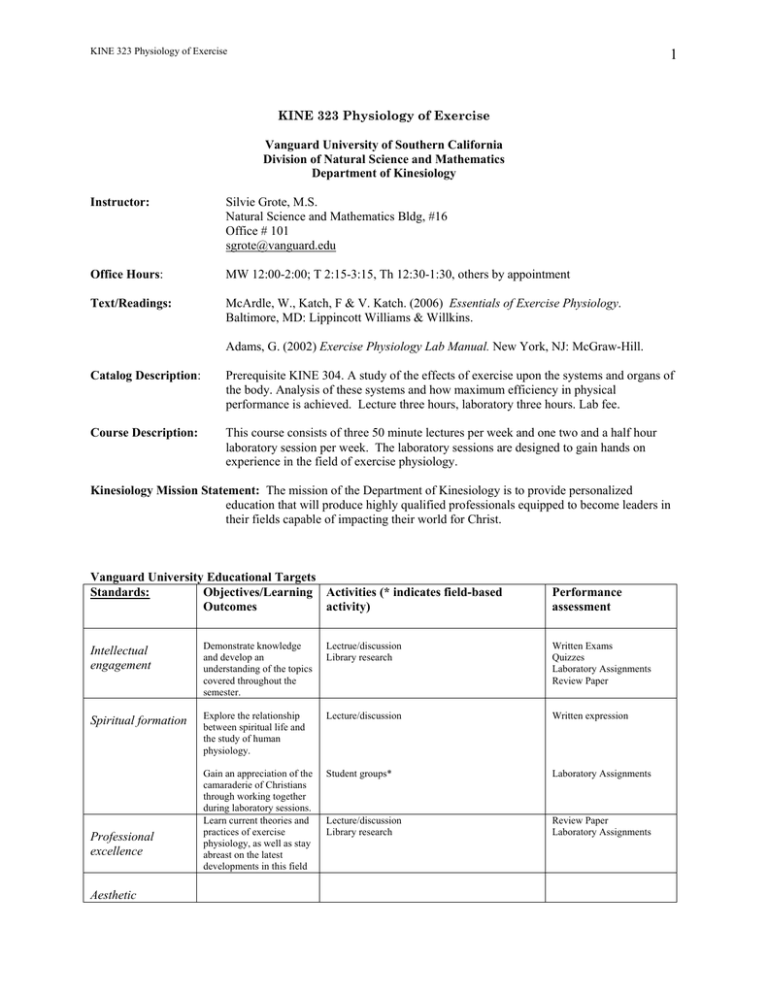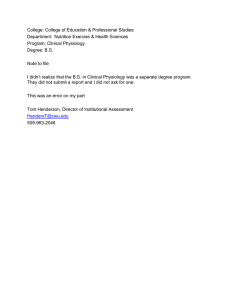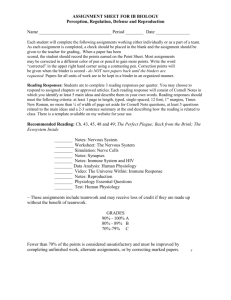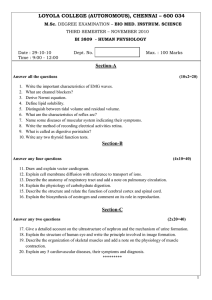KINE 323 Physiology of Exercise
advertisement

KINE 323 Physiology of Exercise 1 KINE 323 Physiology of Exercise Vanguard University of Southern California Division of Natural Science and Mathematics Department of Kinesiology Instructor: Silvie Grote, M.S. Natural Science and Mathematics Bldg, #16 Office # 101 sgrote@vanguard.edu Office Hours: MW 12:00-2:00; T 2:15-3:15, Th 12:30-1:30, others by appointment Text/Readings: McArdle, W., Katch, F & V. Katch. (2006) Essentials of Exercise Physiology. Baltimore, MD: Lippincott Williams & Willkins. Adams, G. (2002) Exercise Physiology Lab Manual. New York, NJ: McGraw-Hill. Catalog Description: Prerequisite KINE 304. A study of the effects of exercise upon the systems and organs of the body. Analysis of these systems and how maximum efficiency in physical performance is achieved. Lecture three hours, laboratory three hours. Lab fee. Course Description: This course consists of three 50 minute lectures per week and one two and a half hour laboratory session per week. The laboratory sessions are designed to gain hands on experience in the field of exercise physiology. Kinesiology Mission Statement: The mission of the Department of Kinesiology is to provide personalized education that will produce highly qualified professionals equipped to become leaders in their fields capable of impacting their world for Christ. Vanguard University Educational Targets Standards: Objectives/Learning Activities (* indicates field-based Outcomes activity) Performance assessment Intellectual engagement Demonstrate knowledge and develop an understanding of the topics covered throughout the semester. Lectrue/discussion Library research Written Exams Quizzes Laboratory Assignments Review Paper Spiritual formation Explore the relationship between spiritual life and the study of human physiology. Lecture/discussion Written expression Gain an appreciation of the camaraderie of Christians through working together during laboratory sessions. Learn current theories and practices of exercise physiology, as well as stay abreast on the latest developments in this field Student groups* Laboratory Assignments Lecture/discussion Library research Review Paper Laboratory Assignments Professional excellence Aesthetic KINE 323 Physiology of Exercise expression Responsible stewardship Sociocultural responsiveness Gain an appreciation of human body and its intricate design. Practice wellness in order to keep yourself healthy throughout the semester to complete all the assignments on time and participate in the lecture and lab discussion. Understand a human body and its relationship to stress e.g. exercise and sports. Learn and recognize the differences in age groups and genders as they relate to human performance. Learn about the effects of drugs on human performance. 2 Lecture/discussion Lab* Lab Assignments Lecture/discussion Lab groups* Written exams Review Paper Lab Assignments Lecture/discussion Lab groups* Written exams Review Paper Course Format: The class format includes lectures, class discussions, laboratory assignments and a student generated review paper. The evaluation process includes exams, quizzes, laboratory assignments and a review paper. Student should bring note-taking material to lectures and labs and wear clothing appropriate for exercising for every laboratory session. Course Content: Introduction to exercise and sports physiology Muscular control of movement Neurological control of movement Neuromuscular Adaptations to Resistance Training Metabolism and basic energy systems Hormonal regulation of exercise Metabolic Adaptations to training Cardiovascular control during exercise Respiratory regulation during exercise Cardiorespiratory adaptations during exercise Thermoregulation and exercise Ergogenic aids and performance Growth, development, and the young athlete Aging and the older athlete Cardiovascular disease and physical activity Course Requirements: 1. Assigned Readings: Read the assigned material from the text. Participate in the class discussion 2. Laboratory Activities: Participate in each laboratory activity as they relate to assigned readings and course material. Turn in the laboratory assignments on time. 3. Demonstrate knowledge on written quizzes and exams relative to course work assigned. 4. The student will review four articles form the field of exercise physiology; articles will be thematically related and selected from a professional journal. The article review will be introduced by a two to three page discussion that ties together the four articles. Such discussion should include a summary and evaluation of the reviewed literature. Copies of the four journal articles must be turned in with their respective reviews. The paper will be typed, double spaced with font no bigger than 12. One point penalty a day will apply to all late assignments. The paper will be presented to the class in a 10 -15 minute power point presentation format. KINE 323 Physiology of Exercise Evaluation: Lecture Quizzes Exam #1 Exam #2 Exam #3-Comprehensive Final Review Paper Presentation Total Points: A = 93%-100% A- = 92 -90% B+ = 89-88% B = 87-83% B- = 82-80% C+ = 79-78% C = 77-73% C- = 72-70% 3 40pts. 100pts. 100pts. 160pts. 70pts. 30pts. Lab Assignments/Homework Midterm Final 75pts. 25pts. 25pts D+ = 69-68% D = 67-63% D- = 62-60% F = 59% and below Expectations: All work submitted should be legible and grammatically correct, and computer generated/typed when applicable. Make-up exams and quizzes will only occur for extreme illness or excused absence and should be cleared ahead of time with the instructor whenever possible. Laboratory assignments are due the following week. Absences: According to the University policy, you may not miss more than 20% of all class sessions or your resulting grade will be Failure. More than 6 absences will result in an automatic F. Excused absences are for University-sponsored functions, extreme illness, other situations approved by the instructor. 0-1 3 4 5 6 7 Five extra points added to final grade total Allowed absences Grade reduced by ½ letter grade Grade reduced by one whole letter grade Grade reduced by 1 ½ letter grades Failure Tardiness: Students are expected to arrive to class on time and will be dismissed on time. Tardiness in excess of 10 minutes will be counted as an absence. Disability Statement: Students with a disability that affects their academic performance are expected to arrange for a conference with the instructor in order that appropriate strategies can be considered to ensure that participation and achievement opportunities are not impaired. Students should contact Director of Learning Skills, Barbi Rouse in the Student Life Center, X 2540. KINE 323 Physiology of Exercise 4 LABORATORY SCHEDULE Date Topic Reading Jan 10 Introduction to Measurements Metric Conversions Ch 1, 2, 3 Jan 17 Body Mass Index Anthropometric Measurements Ch 23 Ch 24 Jan 24 Skinfolds Ch 25 Jan 31 Static and Dynamic Strength Ch 4, 5 Feb 7 Resting and Exercise Blood Pressure Ch 16, 17 Feb 21 Resting and Exercise Lung Volumes Flexibility Ch 20, 21 Ch 22 Feb 28 Exam March 7 Vertical Power Ch 8 March 21 Anaerobic Cycling Anaerobic Treadmill Running Ch 9 Ch 11 March 28 Aerobic Stepping Aerobic Cycling Ch 13 Ch 16 April 11 Aerobic Run/Walk Ch 12 April 18 VO2 max, Resting and Exercise ECG Ch 15, 18, 19 April 25 Exam The student must be in class for the laboratory exercises to receive credit for the assignment. KINE 323 Physiology of Exercise Course Sequence: Subject to Change Date Topic Week 1-5 An introduction to exercise and sports physiology Macronutrients and Micronutrients Food Energy and Optimum Nutrition for Exercise Nutritional and Pharmacologic Aids to Performance Fundamentals of Human Energy Transfer Human Energy Transfer during Exercise Measuring and evaluation human energygenerating capacities during exercise Energy expenditure during rest and physical activity Week of Feb 12, 2007 Week 6-11 Exam #1 Week of March 26, 2007 Week 12-16 Exam #2 May 2, 2007 8:00-10:00 AM The pulmonary system and exercise The cardiovascular system and exercise The neuromuscular system and exercise Hormones, exercise, and training Training the anaerobic and aerobic energy systems The environment and special aids to performance Body composition, obesity and weight control Successful Aging Clinical aspects of exercise physiology Exam #3- Final 5 McArdle Katch Ch 1 Ch 2 Ch 3 Ch 4 Ch 5 Ch 6 Ch 7 Ch 8 Ch 9 Ch 10 Ch 11 Ch 12 Ch 13 Ch 15 Ch 16 Ch 17 Ch 18


